Synopsis: Nuclear Shield—Pakistan has agreed to extend its nuclear deterrence to Saudi Arabia under a new defense pact, signaling a major geopolitical shift in the Middle East amid Israel tensions.
By Qalam Times News Network
New Delhi | September 20, 2025
Nuclear Shield for Riyadh

Nuclear Shield is now officially extended to Saudi Arabia after Pakistan declared its readiness to make its nuclear deterrence available to the Kingdom. Pakistani Defense Minister Khawaja Asif confirmed that under the newly signed defense agreement, Riyadh will have access to Islamabad’s nuclear umbrella whenever required. His remarks mark the first open acknowledgment that Saudi Arabia has secured Pakistan’s nuclear shield.
The announcement followed the mutual defense pact signed this week between Prime Minister Nawaz Sharif of Pakistan and Saudi Crown Prince Mohammed bin Salman.
Message to Israel
Analysts told the Associated Press that this Nuclear Shield is a direct signal to Israel, long considered the only nuclear-armed state in the Middle East. The timing of the pact is crucial, coming just days after Israel targeted Hamas leaders in Qatar, killing six people. That strike has reignited security concerns among Gulf states, who increasingly doubt Washington’s commitment to their defense.
Pakistan’s Nuclear Capability
Speaking to Pakistan’s Geo TV on Thursday, Defense Minister Asif was asked if Riyadh would benefit from Pakistan’s nuclear deterrence. He responded firmly:
“Our nuclear capability was established long ago when we conducted tests. Since then, our forces have been trained and prepared for battlefield realities. What we have, under this agreement, will be available to Saudi Arabia.”
The defense accord clearly states that an attack on either nation will be treated as an attack on both. While the International Atomic Energy Agency (IAEA) has yet to respond, Asif criticized Israel for never disclosing its suspected nuclear arsenal to the IAEA.
Saudi Funding and Pakistan’s Nuclear Program
Saudi Arabia has long played a role in sustaining Pakistan’s nuclear program. Retired Brigadier General Feroz Hassan Khan told AP that Riyadh provided generous financial support at critical stages. Pakistan endured years of U.S. sanctions over its nuclear ambitions and, more recently, faced fresh restrictions on its ballistic missile program during the Biden administration.
The defense pact now brings that history full circle, turning Saudi Arabia into a formal beneficiary of Pakistan’s Nuclear Shield.







